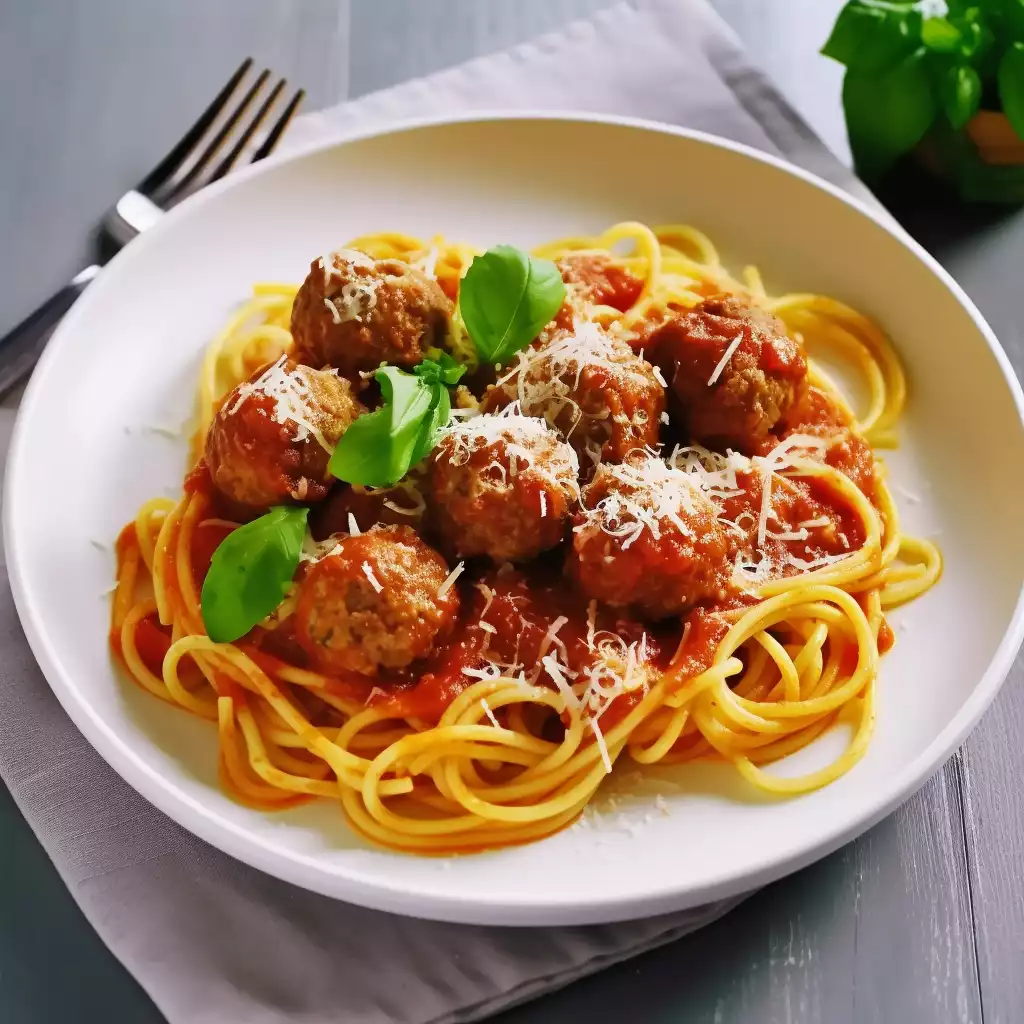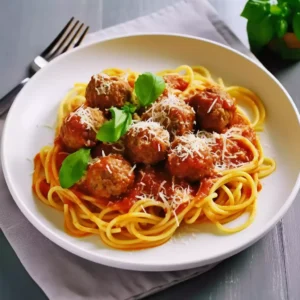
Spaghetti Meatballs, a dish that stands as a testament to the timeless allure of Italian cuisine, has been a beloved staple in kitchens around the world. This dish, which marries spaghetti with succulent meatballs bathed in a rich tomato sauce, is not just a meal but a cultural icon, steeped in tradition and history.
The origins of Spaghetti Meatballs trace back to the Italian diaspora, when Italian immigrants in the United States adapted their culinary traditions to new ingredients and influences.
While meatballs (polpette) have been a part of Italian cooking for centuries, the pairing with spaghetti is actually more American than Italian, a delicious outcome of the melting pot of cultures.
One of the charms of this dish lies in its simplicity and approachability. Even for a beginner in the kitchen, Spaghetti Meatballs is a forgiving and rewarding dish to prepare.
The process of shaping the meatballs, simmering the sauce, and cooking the spaghetti to just the right level of al dente, is as much about learning fundamental cooking skills as it is about creating a delicious meal.
When it comes to variations, the possibilities are endless. The basic recipe can be modified to suit different dietary needs or taste preferences. For instance, the meatballs can be made with a mix of beef and pork, or entirely from turkey or chicken for a lighter version.
Vegetarians aren’t left out either – lentil or mushroom-based meatballs offer a delightful plant-based alternative.
The sauce too invites experimentation. Some cooks prefer a simple tomato sauce, letting the flavour of the tomatoes shine, while others might add a splash of red wine, some chilli for a bit of heat, or a few anchovies for depth. The joy of cooking Spaghetti Meatballs lies in making the dish your own.
Moreover, this dish is more than just a meal; it’s a connector of people. Often featured in family gatherings and festive occasions, it embodies the spirit of sharing and togetherness.
There’s something undeniably heartwarming about passing around a big bowl of spaghetti topped with generous, steaming meatballs and sauce.
Spaghetti Meatballs also has an enduring presence in popular culture, often depicted in movies and literature as a symbol of love, family, and comfort. It’s the kind of dish that can turn a regular evening into something special, creating memories around the dinner table.
Spaghetti Meatballs is a dish that transcends its humble ingredients. It’s a testament to the beauty of simple cooking and the rich tapestry of culinary traditions.
Whether you’re cooking for one, for a family, or for a gathering of friends, it’s a recipe that promises not just a delicious meal, but a delightful experience in the kitchen.
Expert Tip: For juicier meatballs, mix in a little milk with your breadcrumbs. This helps to retain moisture, making your meatballs tender and flavourful.
Before we explain each ingredient, it’s important to understand that every component in this Spaghetti Meatballs recipe plays a unique role in creating the final dish. The beauty of this recipe lies in how these ingredients work together to create a harmonious balance of flavours and textures.
Ground Beef: Ground beef is the main ingredient for the meatballs, providing a rich, meaty flavour.
Its fat content ensures juicy, tender meatballs. If you’re looking for alternatives, ground turkey or chicken can be used for a lighter version, while vegetarian substitute like lentils or mushrooms can mimic the texture of meatballs for plant-based diets.
Spaghetti: This classic pasta type is ideal for this dish due to its ability to hold the sauce well. The long, thin strands intertwine with the meatballs and sauce, ensuring every bite is flavourful. Alternatives like linguine or fettuccine can also be used, but the experience might slightly differ.
Onion and Garlic: These aromatics are key to building the flavour base of the meatballs. Onion adds a subtle sweetness, while garlic provides a pungent depth. For a variation, shallots or leeks can be used for a milder taste.
Egg: The egg in the meatball mix acts as a binding agent, helping the meatballs maintain their shape during cooking. If you need an alternative, a small amount of mashed potato or a commercially available egg replacer can work.
Breadcrumbs: Breadcrumbs help in absorbing moisture within the meatballs, keeping them firm yet tender. For a gluten-free version, you can use ground oats or gluten-free breadcrumbs.
Parmesan Cheese: Parmesan adds a salty, nutty flavour to the meatballs, elevating their taste. If Parmesan isn’t available, Pecorino Romano or Asiago cheese can be great alternatives, or for a dairy-free option, nutritional yeast flakes can be used.
Dried Oregano: This herb adds a subtle, earthy flavour to the meatballs, complementing the beef. You can experiment with other herbs like basil or thyme for a different flavour profile.
Canned Chopped Tomatoes: These form the base of the sauce, offering a rich, tangy taste. Fresh tomatoes can be used when in season, but they might require longer cooking time to reduce and intensify in flavour.
Tomato Paste: This concentrated form of tomatoes deepens the sauce’s flavour, adding a robust tomato essence. In its absence, a few tablespoons of ketchup or a little extra chopped tomatoes can be used.
Sugar: Just a teaspoon of sugar balances the acidity of the tomatoes, bringing out their natural sweetness. If you prefer, honey or a sugar substitute can be used.
Salt and Pepper: These seasonings are essential to enhance the overall flavour of the dish. They should be adjusted according to personal taste.
Fresh Basil: Used as a garnish, basil adds a fresh, aromatic finish to the dish. If basil is not available, parsley or even a sprinkle of dried herbs can be used for garnish.
Each ingredient in this Spaghetti Meatballs recipe has its unique role, contributing to the overall flavour and texture of the dish.
By understanding why each ingredient is used, you can feel more confident about making substitutions that suit your dietary preferences or what you have on hand.
Expert Tip: Enhance the depth of your sauce by adding a splash of red wine. It’ll add a rich, complex flavour that complements the tomatoes and beef beautifully.
Yes, you can make meatballs without breadcrumbs. Breadcrumbs are primarily used to help bind the meatballs and retain moisture.
If you’re looking for alternatives, you can use ground oats, cooked rice, or even mashed potatoes. These substitutes can effectively bind the meatballs while also adding their unique texture and flavour to the dish.
To prevent meatballs from falling apart, make sure your mixture has enough binding agents like egg and breadcrumbs. Also, be gentle when forming the meatballs and avoid overworking the meat, as this can make them tough. Chilling the meatballs before cooking can also help them retain their shape better when cooked.
Frying meatballs first creates a caramelized exterior that adds depth of flavour. However, cooking them directly in the sauce allows them to absorb more of the sauce’s flavour and can result in tender meatballs. Both methods have their merits, so it ultimately comes down to personal preference.
Yes, you can use fresh tomatoes instead of canned for the sauce. Fresh tomatoes will give a lighter, fresher flavour to the sauce. Keep in mind that they may require more cooking time to break down and develop a sauce-like consistency. A mix of fresh and canned tomatoes can also be a great middle ground.
To make this recipe gluten-free, use gluten-free spaghetti and breadcrumbs. You can find these in most supermarkets. Also, ensure that any other packaged ingredients like canned tomatoes and tomato paste are certified gluten-free.
Good side dishes for Spaghetti Meatballs include a crisp green salad, garlic bread, or roasted vegetables. These sides can balance the richness of the meatballs and pasta, adding a variety of textures and flavours to your meal.
Yes, cooked meatballs and sauce freeze well. Allow them to cool completely, then store them in an airtight container. They can be frozen for up to 3 months. To reheat, thaw in the refrigerator overnight and then reheat on the stove or in the microwave.
Expert Tip: Don’t rush the simmering process of the sauce. Slow cooking allows the flavours to meld together and intensify, giving you a more robust and aromatic sauce.
Here are some more recipes for you to enjoy! If you my recipes don’t forget to rate and leave a comment.
If you have any recipe suggestions, please do not hesitate to ask me. A great way to stay in contact with me is through Instagram, Facebook, Twitter and YouTube. Don’t forget to tag me @CookwithNabeela in your recipe photos!

Subscribe now to receive my latest recipes directly in your inbox. Stay up-to-date and never miss out!

I love to cook! I want to share with you my favourite, delicious family-friendly recipes. I want to inspire you to create fantastic food for your family every day.
Add your first comment to this post